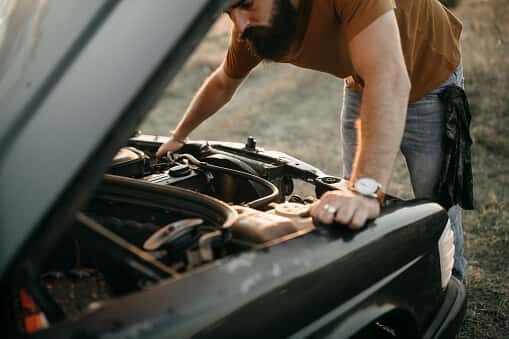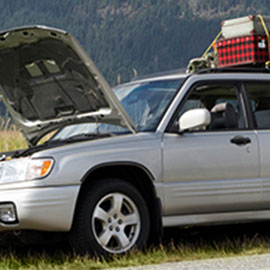How much does a transmission cost?
Expect to pay around $6,000 for a new transmission
+3 more

Here’s the bad news: If you need to replace your transmission, it’s not going to be cheap. The average transmission replacement costs between $5,749 to $6,303. For a lot of cars, the parts are priced between $4,658 and $4,702, and the labor costs between $1,091 and $1,601.
But exactly how much it will cost depends on your vehicle. However, a full replacement might not be necessary. And even if it is, there are more budget-friendly options to consider.
If you need a transmission replacement, you can expect to spend anywhere from around $3,000 to $15,000 or more, depending on your vehicle.
Jump to insightYou can usually save some money on a replacement by going with a remanufactured or salvaged transmission. Just know that there can be more risk involved with used parts.
Jump to insightHaving your car towed to a specialized transmission center might also reveal more affordable options, like a rebuild or minor repair.
Jump to insightIf you suspect you’re having transmission problems, don’t wait to bring it to the mechanic. Even a short delay may cost you in the long term.
Jump to insightHow much does it cost to replace a transmission?
We gathered estimates for replacing the transmissions in three sample vehicles in Austin, Texas, to help give you an idea of what a replacement might cost you.
Transmission replacement costs by vehicle
| Vehicle | Parts | Labor | Total cost |
|---|---|---|---|
| 2005 Nissan Altima | $2,248 to $3,864 | $790 to $1,258 | $3,038 to $5,222 |
| 2016 Acura RDX | $5,335 to $5,914 | $1,594 to $1,766 | $6,929 to $7,680 |
| 2018 Honda Civic | $4,973 to $5,448 | $1,243 to $1,362 | $6,216 to $6,810 |
| 2018 Ford F-150 | $2,802 to $6,137 | $1,036 to $2,270 | $3,838 to $8,407 |
| 2015 BMW X3 | $9,136 to $12,992 | $1,613 to $2,293 | $10,750 to $15,285 |
Transmission cost factors
Newer, higher-end vehicles often require more expensive parts, while cheaper vehicles usually have lower parts costs. If you have a luxury car, you may be able to save money if the manufacturer also makes cheaper models with compatible parts, though.
Transmission prices also depend on where you’re getting your transmission from. You can usually save money by choosing a remanufactured or salvaged transmission. Going with a used replacement can be risky, depending on how the seller warrants its products, but it’s an option you should at least be aware of.
Labor costs vs. parts costs
Steve Sargent, the owner of a Mr. Transmission franchise in Cary, North Carolina, told us that front-wheel drive cars (like most compact cars and minivans) usually require more labor during a transmission replacement than rear-wheel drive cars (like most trucks and sports cars).
Talk to your mechanic to see what kinds of replacement transmissions they recommend.
European luxury cars, like our sample BMW above, also tend to require extra labor. “When you get into the Euro cars, the number can get pretty big. … There’s so much you have to take off to get to what you want to get to it. That's where the labor is. [The] exhaust has to come out. All these under panels have to come off. And so there's a lot of things in your way,” Sargent said.
» MORE: 10 most expensive car repairs
Speed and gear count
Four-speed transmissions are older, simpler transmission types. Because they have fewer gears and less complex engineering, they're generally cheaper to replace. More gears typically mean more components, greater precision and potentially higher labor costs for installation.
“Four-speed transmissions are going to run between $3,000 and $4,000. If it's a six-speed, you're probably looking at between $4,000 and $5,000. And if it's an eight- or 10-speed, I mean, it could run upwards of $8,000 or $9,000,” Sargent said last year. If you don’t know how many speeds your vehicle’s transmission has, it shouldn’t take more than a quick Google search to find out.
Automatic vs. manual transmission
Manual transmissions are usually cheaper to replace because they’re simpler and have fewer parts. Since automatic transmissions are electronically complex, they require more labor-intensive installation. Automatics are more convenient and widely used, but repairs can be pricey.
How much does it cost to rebuild a transmission?
Rebuilding a transmission tends to cost less than a full replacement, but what you’ll pay still depends on your vehicle. Sargent told us you should expect to pay $2,000 to $3,500 for a rebuild on a simpler, four-speed transmission — with prices usually going up from there.
A rebuild is an overhaul of your transmission that involves disassembling, cleaning, inspecting and refurbishing the entire unit.
However, he also mentioned that costs vary significantly depending on what went wrong with your transmission. “If it is mechanical failure, the costs are fairly low. So it goes along with the ‘four-speed/six-speed’ type thing. The four-speeds are cheaper than six-speeds,” said Sargent. “And older transmissions are cheaper than newer transmissions.”
Sargent went on to explain that some newer transmissions have electronic components that can make rebuilds more expensive because they’re integrated into larger systems. “A $50 sensor that can be replaced on an old transmission is now going to be probably $600 or $700 of a solenoid pack, which is the whole electronic piece. They've all gone in that direction.”
Signs you need transmission work
Just because your vehicle unexpectedly changes gears or struggles to stay in gear doesn’t mean your transmission is to blame. Other moving components in your engine can cause a grinding sound, and a burning smell can come from lots of places.
Many of these symptoms can be caused by other vehicle issues. Sargent said that about half of the people who come into his shop for transmission problems are actually dealing with symptoms caused by something else.
It’s important to reach out to a competent mechanic as soon as you notice problems. Ideally, you can catch the issue before it starts to get worse or cause more costly problems.
Symptoms of a failing transmission
If you’re having car trouble and you’re not sure if your transmission is the cause, here are some signs to watch out for:
- Erratic shifting: If your automatic transmission is changing gears when it shouldn’t, it could be due to internal components failing. In newer vehicles, your vehicle’s computer may point this out for you, but in older ones you’ll need to watch for this on your own.
- Popping out of gear: If your manual transmission doesn’t stay in gear, it could be due to a number of problems, like worn synchronizers or faulty shifter cables.
- High-revving engine: With a faulty transmission, your engine may rev higher than normal. This may also be accompanied by your transmission slipping.
- Burning smell: An unexplained burning smell can be due to low fluid within your transmission, but the burning smell can also come from your transmission overheating. You might just need to add fluid, but if you have added fluid and you still smell something, you should have it looked at.
- Grinding gears: If it sounds like your gears are grinding as they shift, especially with a manual transmission, you might have a problem with your shifter, shift synchronizer rings or clutch.
- Weird noises: Other sounds, like whirring, humming and clunking, can be signs of a bad transmission. In some cases, it might just be a sign that fluid is low, but it’s important to check it out either way.
- Shaking: If you feel a weird shaking sensation when switching gears, it could be a sign of a bigger transmission issue.
- No movement: It’s a pretty serious issue if your vehicle won’t respond to your throttle input while in gear. While there are a lot of reasons why this could be, the transmission is a common culprit.
Fixing vs. replacing a transmission
According to Sargent, some mechanics will recommend replacing a transmission simply because they don’t have the expertise needed to do anything else. Dedicated transmission specialists might be able to provide other solutions for you, though, and they can even save you money.
“The one kind of underlying theme for everybody that comes in here is that it's the black box that none of the other general repair shops want to touch,” said Sargent. He said that about half of the transmission issues his shop sees are repairable.
“If your general repair person gives you an opinion, I would have a transmission person double-check to make sure. And the worst case is you find out that they were right.”
Is it worth rebuilding or replacing a transmission?
A transmission is one of the most expensive parts to fix on most vehicles, and whether you need minor repairs, a rebuilt transmission or a full replacement should be determined by a trained mechanic. Sometimes, you might actually be better off cutting your losses and buying a new car.
- If you have a vehicle that’s not worth much, rebuilding or replacing the transmission may not be worth it.
- If you have a newer vehicle with relatively low mileage, even an expensive transmission replacement can be a good long-term investment.
The potential problem with minor repairs is that they might not solve the underlying issue that caused them, leaving you with more extensive problems down the road. (Adding fluid may help for the time being, but it won’t fix the potential leak that caused the issue in the first place.) Talk to your mechanic about whatever issues they identify, and ask if there are any root problems that need to be addressed.
Bottom line
Sargent advised people to think about their car’s overall condition before committing to repairs. “We see people put a lot of money into things that I wouldn't myself advise them to do,” he said.
“I tell him that I wouldn't put this money in this transmission because you have engine issues, the car needs tires. … And sometimes we end up with those cars in our lot because people walk away from them because the numbers just get out of control. … We want to advise the customer, ‘You know, maybe this isn't the best use of your money. Maybe there's something else that you need to do.’”
» NEXT: Average car maintenance costs
FAQ
What is a transmission?
Your car’s transmission has roughly the same function as the gears and chain on a bicycle. As part of your drivetrain, it helps transfer the power created by your engine to your wheels.
Transmissions also make sure the vehicle maintains a safe number of revolutions per minute (RPMs) by switching gears. They do this in different ways:
- Manual transmissions require your input to change gears when your RPMs are too low or too high.
- Automatic transmissions switch gears on their own.
- Continuously variable transmissions (CVTs) are a type of automatic transmission that shifts through an uninterrupted range of gear ratios.
Most automatic transmissions are made up of planetary gear sets, a hydraulic system, seals, gaskets, a torque converter and a computer. Transmissions with five or six gears are normal in most modern cars, but some cars can have up to 10 gears.
Is it cheaper to repair a transmission?
Depending on the extent of your vehicle's transmission problems, a repair can be a viable alternative to a full rebuild or replacement. (Your mechanic should check for issues that can be fixed easily before undertaking any more serious corrective measures.) However, transmission repair costs are hard to estimate since there's so much variety in the types of repairs you may need.
The solution could be as simple as adding fluids, a transmission fluid change or a transmission flush. Other minor repairs might cost you several hundred dollars, but that’s still much more affordable than a replacement or rebuild.
“We like to be the hero rather than telling you you need a transmission,” said Sargent. “I'd rather fix it for $300 to $400 and make a customer for life.”
Your average mechanic may not know enough about transmissions to identify simple fixes. Reach out to a shop that specializes in transmissions before you assume repair isn’t an option.
Sargent mentioned faulty range sensors and speed sensors as common problems that cost under $500 to fix, and some transmissions may only require a software update to start running smoothly again. (If you’re wondering, your range sensor tells your car’s computer what gear you’ve selected, and your input and output speed sensors tell the computer if your transmission is slipping.)
How long is a transmission supposed to last?
A new transmission should be designed to last the life of your car. (If you want a specific number, we’ve seen unverified claims that transmissions last 150,000 to 200,000 miles, on average.)
How do you test a transmission?
Generally speaking, just drive the car and watch for signs of slipping gears, delayed engagement or rough shifting. Burning smells or loud noises can be a sign of a bad transmission as well.
If you’re in a vehicle with an automatic transmission, watch the gear indicator to see if it’s behaving how it should. If you’re using a manual transmission, cycle through the gears and manipulate the clutch to make sure everything is engaging properly.
Do extended car warranties cover transmissions?
An extended auto warranty should cover your transmission as long as you have powertrain coverage or better. If you have a more limited or specialty policy, it might not be covered, though.
“My transmission stopped working last year and couldn't drive my car. … The mechanic said, it would cost over $5,000 for a new transmission. I called CarShield and was transferred to the claims department. … I only had to pay my $100 deductible. I was overjoyed!” wrote Lynette in Michigan.
Deshawn, a Consumer Affairs reviewer from New York, said: “Omega covers everything and I love that. I had a transmission issue and they changed the transfer case. I just took it to the shop and they took care of everything for me.”
It’s also worth mentioning that an extended warranty won’t cover the cost of fixing your transmission in all cases. If your transmission goes bad as a result of neglected maintenance or an uncovered part failing, you’ll probably have to pay out of pocket.
For example, Sargent told us about a common problem with older Nissan Frontiers where the radiator and transmission cooler would leak coolant into the truck’s transmission.
“What ends up happening is the transmission on those vehicles is a fine transmission, but the radiator’s the weak point. And the customer comes in and says, ‘My transmission isn't working.’ And we open it, look at the transmission fluid, and it's milkshake because it's got coolant in it. The heartbreak of it is that a lot of people will buy an extended warranty, and they don't cover this. … The transmission is a covered part, but it was broken by a noncovered part, which is the radiator,” he explained.
Cases like this also show why paying more for bumper-to-bumper coverage is often worth it if you’re going to buy an extended warranty.
» LEARN: What does a car warranty cover?
Does car insurance cover transmissions?
Car insurance usually doesn’t cover fixing a transmission. Auto coverage only pays for damage from things like accidents or vandalism, so unless your transmission is broken due to a wreck or an “act of God,” the cost of fixing your transmission will likely not be covered.
» MORE: Car warranty vs. car insurance
How often should you change transmission fluid?
Once you have your transmission fixed, you should keep up with maintenance to minimize the chance of any more problems in the future. One of the easiest ways to ensure the continued health of your transmission is to change its fluids. Transmission fluid lubricates the bearings and gears inside your transmission, but like the oil in your engine, it must be changed and replaced regularly.
Some manufacturers recommend changing your transmission fluid every 150,000 miles, while some mechanics recommend changing it every 50,000 miles. If your vehicle has a manual transmission, you might need to replace the fluid more often than with an automatic transmission. Refer to your manual to see what your manufacturer recommends for your make and model.
Article sources
ConsumerAffairs writers primarily rely on government data, industry experts and original research from other reputable publications to inform their work. Specific sources for this article include:
- RepairPal, “Transmission Replacement Cost Estimate.” Accessed May 29, 2025.
- Universal Technical Institute, “What Is a Transmission and How Does It Work?” Accessed May 29, 2025
- AAMCO, “Common Reasons for Transmission Problems.” Accessed May 29, 2025.
- Mister Transmission, “What Is a Transmission Rebuild?” Accessed May 29, 2025.






